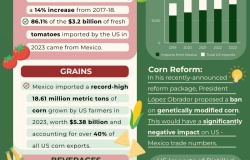Second Cross Border Forum on Agricultural Interdependence
At the second Cross Border Forum on Agricultural Interdependence, panelists explored the best policy approaches to further integrate and better position the North American agriculture sector for global competition, and assessed the economic implications of country of origin labeling (COOL) on NAFTA members.
Overview
It is imperative that the United States, Canada, and Mexico maintain a "spirit of cooperation" in order to remain competitive in an increasingly crowded international agriculture market, said George Groeneveld, Alberta's Minster of Agriculture and Food. Groeneveld was joined by Deputy Secretary of the U.S. Department of Agriculture Chuck Conner to deliver the opening remarks of the Canada Institute's second Cross Border Forum on Agricultural Interdependence on June 19, 2007. The forum, hosted in cooperation with the government of Alberta, explored the best policy approaches to further integrate and better position the North American agriculture sector for global competition, and assessed the economic implications of country of origin labeling (COOL) on NAFTA members. U.S. and Canadian government officials, industry representatives, and agricultural experts participated in a closed-door discussion following panel presentations to discuss policy options, competitiveness, and the challenges of further integrating the North American agriculture sector. The forum continued with a keynote luncheon featuring remarks from Minister Groeneveld and former Congressman Charles Stenholm.
Creating a Competitive Advantage
NAFTA has been a "positive force" for advancing North American agriculture integration and is a principal reason why North American agriculture commodities remain competitive in the global market, said Floyd Gaibler of the U.S. Department of Agriculture. He cited recent figures indicating that between the years 1995 and 2006, NAFTA members have enjoyed an approximate 30 percent increase in agricultural trade within North America, and a 6 percent increase in agriculture exports worldwide. According to Gaibler, these figures reflect the critical need for further regulatory cooperation between NAFTA members in order for "continued integration and expansion of trade" to take place. Gaibler noted that shared North American institutions, such as the Security and Prosperity Partnership and the North American Biotechnology Initiative, could help facilitate discussion on how to proceed with regulatory cooperation and provide a necessary forum to develop a trilateral strategy to improve North American agriculture competitiveness globally.
Susan Harper, the Canadian Embassy's minister-counsellor for economic and trade policy, also highlighted NAFTA as a "key driver" for increased agricultural trade within North America. She stressed that since 58 percent of Canadian agriculture exports are destined for the United States, the future of the country's agriculture sector largely depends on ensuring a "well-functioning and efficient" U.S.-Canadian border. She urged the United States to reconsider recently implemented policies—such as the unexpected introduction of new testing requirements for melamine—that undermine the strong North American trading zone developed through NAFTA. Undersecretary for Mexican Agribusiness Promotion Jeffrey Jones also emphasized the importance of strengthening NAFTA, noting that of the twelve free trade agreements Mexico has signed, NAFTA is by far the most important to the country's economy. Enhancing NAFTA, maintained Jones, is critical to advancing North American integration in the agriculture sector and would result in increased trade between Canada, Mexico, and the United States. To advance integration, Jones called for increased agricultural policy harmonization among NAFTA members, as well as developing common food security policies and engaging in trilateral discussions to address biosecurity issues.
Nevertheless, initiatives to improve NAFTA must be coupled with efforts to "level the international playing field" in order for North American agriculture products to remain competitive abroad, said Harper. She urged NAFTA members, particularly the United States, to work through the World Trade Organization (WTO) to eliminate all forms of export subsidies, improve North American market access globally, and work to reduce "trade distorting" domestic support in the agriculture sector.
Despite Canadian calls for reform, Gary Hufbauer, senior fellow of the Peterson Institute for International Economics, maintained that the United States is unlikely to make significant changes to its own agriculture subsidy programs. According to Hufbauer, the currently thriving U.S. agriculture sector leaves little incentive for policymakers to make drastic changes to the country's agriculture sector. Consequently, the prospect for future disputes over national agriculture policies between NAFTA members remains probable. However, rather than resolving regulatory disputes through the WTO, Hufbauer proposed the formation of a "blue ribbon council" that would feature agriculture regulatory experts from Canada, Mexico, and the United States. The council would act as a mechanism to advise NAFTA members on how to resolve disagreements that arise in the North American agriculture sector.
Discussion of a Controversial Law
The issue of country of origin labeling (COOL) has emerged as a particularly contentious issue in the Canadian, U.S., and Mexican agriculture sectors. COOL was included in the U.S. 2002 Farm Bill, and requires retailers to inform consumers of the country of origin of certain agricultural products. Advocates of the law, noted James Mintert of Kansas State University, contend that COOL would enhance food safety and quality, as well as increase demand for domestically produced products. Those opposed argue that COOL will prove to be extremely expensive to implement, and would do little to improve food safety. According to Mintert, because COOL does not impact the way agriculture commodities are produced and regulated, the law does nothing to benefit consumers from a food safety or quality perspective. In contrast, noted Mintert, COOL principally serves to increase the production costs of North American agricultural products and should therefore be viewed as simply a non-tariff barrier: "If it looks and feels like a non-tariff trade barrier, it probably is."
John Masswohl of the Canadian Cattlemen's Association (CCA) agreed with Mintert's conclusion, contending that COOL will only succeed in weakening the efficiency of the North American agriculture sector and benefit competitor nations. To counter the impact of COOL, Masswohl said that the CCA intends to take advantage of Canada's "good image" and reputation for high quality goods when marketing Canadian beef in the United States. Masswohl's concerns over COOL were reiterated by Barry Carpenter, CEO and executive director of the U.S. National Meat Association (NMA). He stressed that the implementation costs of COOL would be particularly onerous on suppliers, and said that the NMA would continue its efforts to reduce the number of products affected by the law. Carpenter also described the current definition of "origin" under COOL as "unworkable," contending that North America's highly integrated agriculture supply chain makes it extremely difficult to trace the known origin of a product back to one NAFTA member.
Despite COOL's flaws, the North American agriculture sector must accept that the law has been passed and move forward, said former Congressman Charles Stenholm. He noted that although the provisions under COOL are not perfect, the law does reflect a critical need to improve the traceability of live animals and agriculture products as a way of addressing the threat of bioterrorism and protecting consumers from such health risks as bovine spongiform encephalopathy (BSE), more commonly known as mad cow disease. At a luncheon following the conference, Minister Groeneveld also highlighted the importance of improving North America's ability to trace North American agriculture products, noting that Alberta recently committed 3.6 million dollars to enhance its food traceability programs. However, he remained adamant that COOL would prove particularly costly to the province's cattle industry and ultimately fail to benefit North American consumers: "I cannot stress enough that this policy will not guarantee the safety and quality of meat products in any of our countries."
Drafted by Ken Crist, Program Associate
David Biette, Director, Canada Institute
202-691-4270
Panelists:
Gary Hufbauer, Reginald Jones Senior Fellow, Peterson Institute for International Economics
Floyd Gaibler, Deputy Under Secretary for Farm and Foreign Agricultural Services, U.S. Department of Agriculture
Susan Harper, Minister-Counsellor for Economic and Trade Policy, Embassy of Canada
Jeffrey Jones, Undersecretary for Agribusiness Promotion, Secretaría de Agricultura, Ganadería, Desarrollo Rural, Pesca y Alimentación, Mexico
Helmut Mach, Professor of Canada-U.S. Trade Relations, University of Alberta
James Mintert, Professor of Agricultural Economics, Kansas State University
Barry Carpenter, CEO and Executive Director, National Meat Association
John Masswohl, Director, Government and International Relations, Canadian Cattlemen's Association
Charles F. Conner, Deputy Secretary, U.S. Department of Agriculture
The Hon. Charles Stenholm, Senior Policy Advisor, Olsson, Frank and Weeda, P.C.
The Hon. George Groeneveld, Minister, Agriculture and Food, Alberta
Documents & Downloads
- Second Cross Border Forum on Agricultural InterdependenceDownload
- Second Cross Border Forum on Agricultural InterdependenceDownload
- Second Cross Border Forum on Agricultural InterdependenceDownload
- Second Cross Border Forum on Agricultural InterdependenceDownload
- Second Cross Border Forum on Agricultural InterdependenceDownload
- Second Cross Border Forum on Agricultural InterdependenceDownload
- Second Cross Border Forum on Agricultural InterdependenceDownload
Hosted By

Canada Institute
The mission of the Wilson Center's Canada Institute is to raise the level of knowledge of Canada in the United States, particularly within the Washington, DC policy community. Research projects, initiatives, podcasts, and publications cover contemporary Canada, US-Canadian relations, North American political economy, and Canada's global role as it intersects with US national interests. Read more
Thank you for your interest in this event. Please send any feedback or questions to our Events staff.










